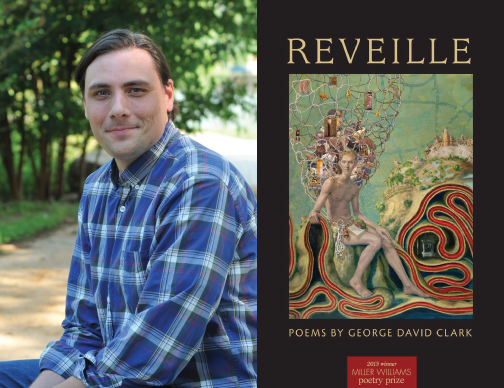Poet George David Clark reads at the Pratt Wednesday, February 26, with James Arthur.

What books have you loved lately?
I first read A.E. Stallings’ Like a little more than a year ago, but I picked it up again last week as I prepare to teach the collection later this semester. It is a brilliant book: even more formally inventive and ambitious than the poet’s earlier work, and Like also showcases the incredible insight and nuance of Stallings’ metaphors. James Arthur’s The Suicide’s Son is another collection I find I’m always recommending. There isn’t another poet writing today who has such a subtle command of free verse rhythms, or who can use that rhythm to so skillfully skewer his readers. It’s really going to be an incredible treat to read with James at the Pratt.
What’s one of your favorite lines of poetry or sentences from a poem?
A few lines I suppose, but what pops into my head at this question today is the beginning of Wallace Stevens’ The Well-Dressed Man with a Beard:
“After the final no there comes a yes / And on that yes the future world depends. / No was the night. Yes is this present sun.”
How did you pick the title of your new book?
Just a couple weeks after my wife and I were married she underwent an emergency surgery to remove a large, ovarian cyst. Then, in the aftermath of that procedure she went on a synthetic morphine, dilaudid, one side effect of which is extreme sleepiness. For the next several weeks Elisabeth was spending 20+ hours each day in bed. I’d leave her sleeping when I went to work and find her still unconscious when I came home in the evening. It was a strange way to begin a marriage and I started writing a series of reveilles—“Reveille” being a French word for waking and, in English, the term for the bugle call that rouses soldiers in the morning. At first my reveilles simply imagined my wife’s waking and her return to health, but soon the theme of waking seemed productive to my imagination well beyond its autobiographical trigger. The book is not about me or my wife directly, but Reveille ultimately seemed about right as an overarching title for the dreams and fantasies, lullabies, and awakenings that tie the collection together.
Which of your poems do you most enjoy reading to an audience, and why?
It’s always nice to share something that will get a few laughs, but lately I’ve been writing poems that are particularly dense in their sounds, many of them deliberately-rhythmed and heavily-rhymed. Poems with debts to Hopkins, and to contemporary poets like Heather McHugh and Christian Wiman and Kay Ryan. These are a great deal of fun to read aloud. They seem to sing themselves at times and help me get as much feeling as I can into my spoken voice.